Search the Special Collections and Archives Portal
Search Results
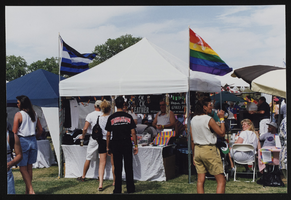
Lock, Stock and Leather booth at Gay Pride: photographic print
Date
Archival Collection
Description
Gay Pride 1999 at Sunset Park; Photographer: Dennis McBride. Lock, Stock, and Leather booth.
Image
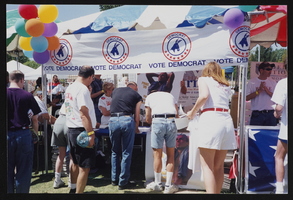
Democratic Party registration booth at Gay Pride: photographic print
Date
Archival Collection
Description
Image
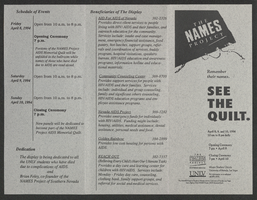
NAMES Project event program
Date
Archival Collection
Description
Text
Bob Stoldal oral history interviews
Identifier
Abstract
Oral history interviews with Bob Stoldal conducted by Claytee D. White on May 22, 2014, May 23, 2014, and March 3, 2016 for African Americans in Las Vegas: a Collaborative Oral History Project. In these interviews, Stoldal discusses his upbringing in California before moving to Las Vegas, Nevada in 1957. He talks about pursuing a career in journalism including working at Channel 3 and Channel 8, his interest in history, and involvement with cultural organizations including the Nevada State Museum, the MOB Museum, and Las Vegas Centennial Commission. Stoldal comments on the experiences of African Americans in Las Vegas including the 1969 Westside protests, sixth grade centers, and the treatment of entertainers.
Archival Collection
Monroe Williams oral history interview
Identifier
Abstract
Oral history interview with Monroe Williams conducted by Claytee D. White on August 15, 2000 and August 22, 2000 for the Boyer Early Las Vegas Oral History Project. In this interview Monroe Williams discusses moving to Las Vegas, Nevada in 1943, living in the historical Westside neighborhood, and being one of the first black fire fighters in Las Vegas. He also talks about being involved with the National Association for the Advancement of Colored Peoples (NAACP), being in the Navy for two years, and his real estate and property management companies.
Archival Collection
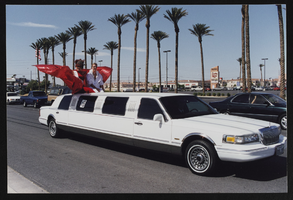
Limosine in the third annual Gay PRide parade: photographic print
Date
Archival Collection
Description
The third annual Gay Pride parade at Sunset Park. Photographer: Dennis McBride (5-8-99).
Image
History of Emergency Medical Services in Nevada Oral History Interviews
Identifier
Abstract
The History of Emergency Medical Services in Nevada Oral History Interviews (approximately 2012-2013) were conducted by Elwood L. Smith and John Kasinger and used for their published work, "Nevada EMS: A History of Emergency Medical Services in Nevada." The interviews were gathered by individuals, groups, and sometimes generations of emergency medical personnel working in the state of Nevada. Every county in the state is represented in the interviews.
Archival Collection
Esther Langston oral history interview
Identifier
Abstract
Oral history interview with Esther Langston conducted by Claytee D. White on February 22, 2005 for the UNLV @ 50 Oral History Project. In this interview, Langston provides an overview of her early life and career in social work. She describes how the women in her family are positive and empowering role models. Langston moves on to explain how she become a social worker over a period of many years. She states that a job experience that helped her gain the qualifications of a social worker was working as an office manager at the Nevada Test Site. She also mentions how she has had to work with conflicts such as racial inequalities.
Archival Collection
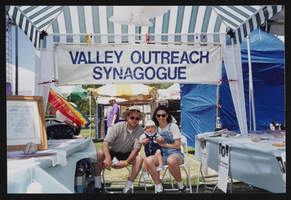
Valley Outreach Synagogue booth at Gay Pride: photographic print
Date
Archival Collection
Description
Image
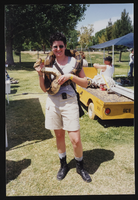
Tasha Hill and a boa constrictor at Gay Pride: photographic print
Date
Archival Collection
Description
Image
